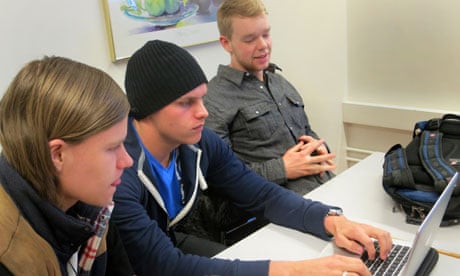"I could access pornography in about three seconds, four at the most," explained Geir Johann Geirsson, 19, his laptop open on the classroom desk at Borgarn high school in a Reykjavik suburb. "If you can access the internet you can access porn, no matter how old you are."
But, in this small north Atlantic nation, a battle against the multibillion-pound industry is under way and campaigners are calling on the new government to introduce ways to block online pornography.
Defenders of the internet – who claimed that proposals from the former government to limit porn promoted censorship and attacked freedom of speech – were given a boost at the end of April when the left-leaning administration was ousted by a centre-right coalition. However, gender equality activists argue that, despite the setback, a debate has been started that will not go away.
Ögmundur Jónasson, the former interior minister, who proposed the change to the law, remains adamant the issue must be tackled. "There are people who want to silence this discussion, but it is a discussion that will not be silenced," he said. "People want to confuse this with an argument about freedom of expression, but I would say it is those who are trying to silence the debate who are not respecting freedom of expression."
If a porn ban happens anywhere in Europe it is likely to be in Iceland, which came top of the World Economic Forum's 2012 Global Gender Gap report and has already implemented significant legislation to regulate the sex industry.
Its outgoing prime minister, Jóhanna Sigurdardóttir, – the world's first openly gay head of government –backed moves to criminalise buyers of sex rather than sex workers in 2009 and banned strip clubs in 2010. Distributing porn has been illegal in Iceland from as far back as 1869 and highly sexualised images of women in advertising – ubiquitous to the point of banality in some countries in mainland Europe – are rare.
But the issue of tackling internet access to sexual images, through the use of web filters, blocked addresses and making it a crime to use Icelandic credit cards to access pay-per-view pornography, has divided opinion in the Icelandic capital.
Even in the classroom in Reykjavik views on the proposed measures were varied. "It's silly, impossible to execute," argued one student. "The only countries that censor the internet are those like North Korea and China; do we want to be like them?" asked another.
There is already work in Iceland's schools to tackle gender inequality; recently all 15-year-olds were shown a sex education video by pop star Páll Óskar Hjálmtýsson, that featured references to porn and consent.
During the gender equality class in Reykjavik, pupils were asked what kind of impact porn had on young people. Eypructur Ragnheidthardóttir, 18, spoke up. "A girl could get a picture in her head of how she should look," she said. "And maybe think she should do everything that she is told, whether she wants to or not."
This is one reason that, while some students were against a ban, many parents were in favour, said teacher Hanna Björg Vilhjálmsdóttir. "I think a shift is definitely happening in Iceland," she said. "Parents are worried about their children and students are thirsty for these gender equality classes, for example. Afterwards the girls say it makes them feel stronger and the boys too have equipment to resist the negative pressure of the porn industry."
The move to limit access to porn was started by those working with women and children, who argued it was having a negative impact on the sexual behaviour of young people. And it is these grassroots groups who insist the fight against porn is not over, despite their disappointment that measures were not introduced before the election of the new government, which they acknowledge is unlikely to push through legislation.
Guðrún Jónsdóttir, a spokeswoman for Stigamot, a centre that helps victims of sexual violence, said: "It would make my life so much easier not to fight porn but I have to. Why should we allow unfettered misogyny, images of rape? The argument is that we need to ban porn because it hurts our children, and that is true, but it also needs to be stopped because it is hate speech and violence against women and affects people's relationships."
She said the group planned write to all new MPs to talk to them about the porn ban. "Of course the fight will continue," she said.
Thorbjörg Sveinsdóttir, a forensic interviewer and therapist at the Icelandic child protection and advocacy agency Children's House, said she had seen a marked shift in the abuse of children as a result of greater access to increasingly hardcore pornography.
She cited an example of a child as young as six being forced to watch and copy pornography by an older child. "Porn is used like a manual," she said. "We see a lot of these cases."
Asked if she thought the window of opportunity to limit pornography was now closed, Sveinsdóttir shook her head. Campaigners were not relying on any one minister, she said, adding: "We will not rely on one man to make this happen. We will not rely on one man. We will rely on the power of women."
